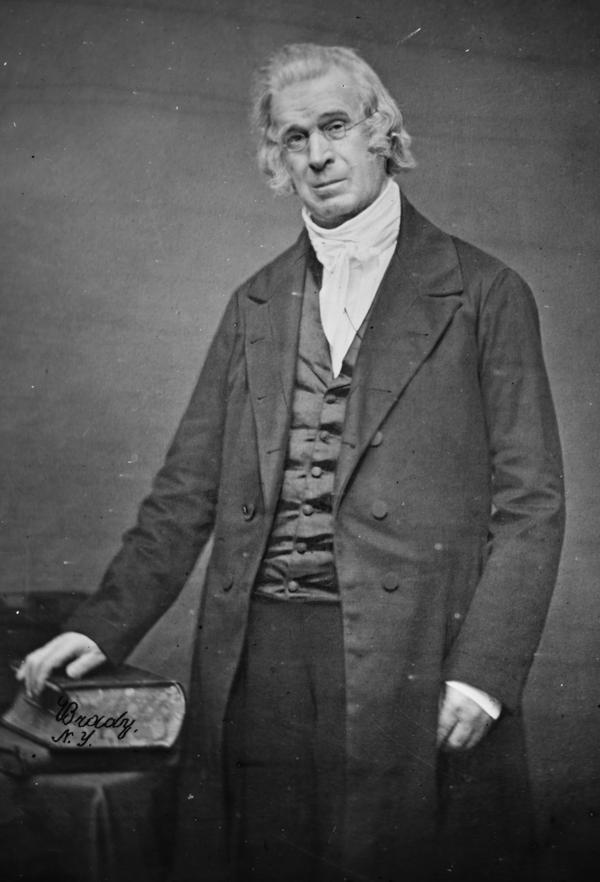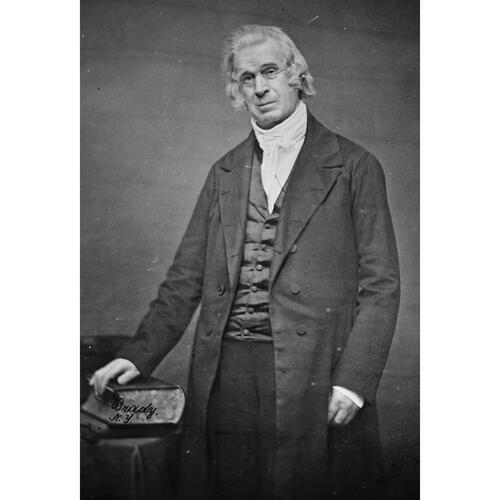
Source: Courtesy of Wikimedia Commons
BANGS, NATHAN, Methodist minister and author; b. 2 May 1778 in Stratford, Conn., son of Lemuel Bangs and Rebecca Keeler; m. 23 April 1806 Mary Bolton of Edwardsburgh Township, Upper Canada, and they had 11 children; d. 3 May 1862 in New York City.
Nathan Bangs, a member of one of Massachusetts’ oldest families, was raised in humble but purposeful surroundings. His father, a well-read blacksmith and an Episcopalian, encouraged him to acquire an education and stimulated his theological interests. Nathan became a teacher and surveyor, skills he practised near Niagara after he came to Upper Canada in 1799. There he met many Methodists, and through their guidance found the religious assurances he had long sought. To the Reverend Joseph Sawyer, in particular, he “fully disclosed” his spiritual turmoil. In August 1800 God opened “the path of life and peace to [his] troubled soul,” and received him “into the household of his saints.”
The Methodist itinerants, always anxious to recruit men of ability and character, promptly pressed Bangs to join their ranks. He was admitted on trial by the New York conference in 1802 and stationed on the Bay of Quinte and Home District circuit. In 1804 he volunteered to become a missionary to the settlements along the lower Thames River, then separated by miles of wilderness from the townships around Niagara and York (Toronto). Leaving New York City in June after being ordained deacon and presbyter, he reached the vicinity of modern Chatham in August 1804. At his first meeting he announced: “I am bound for the heavenly city and my errand among you is to persuade as many as I can to go with me.”
Bangs remained three months in the Thames region and spent the rest of 1804 in the Niagara area. In 1805 and part of 1806 he was on the Oswegatchie circuit in eastern Upper Canada. There he helped organize the first camp meeting in Upper Canada, at Adolphustown. The camp meeting for a time accelerated the diffusion of evangelical teaching and served as a corrective to the frustration and isolation experienced by the settlers. Bangs was sent to Quebec City in 1806, but in his three months there he met strong opposition from the established churches and sometimes held services with only one person present. He moved to Montreal and remained there during 1807, although his congregation numbered only 20. In 1808 he transferred to a circuit in New York State, and in 1812 was appointed presiding elder of the Lower Canada district. The outbreak of war prevented him from moving to Montreal. In his years as a missionary in Canada he had expounded the Methodist gospel from Detroit to Quebec City and had provided an enduring example of that self-sacrificing zeal on which Methodism’s success largely rested. Moreover, Bangs acquired a lasting reputation in Upper Canadian Methodism, a position that was strengthened by the nature of his subsequent career.
Bangs’ transfer to the United States coincided with a massive expansion of American Methodism, a development to which he would make significant contributions. He was a highly effective preacher, a skilful administrator and legislator, and on several occasions a reluctant candidate for episcopal office. More important, as “book agent” from 1820 to 1828 he was the effective founder of the Methodist publishing enterprise. He raised the standard of Methodist journalism as editor of the Christian Advocate and the Methodist Magazine and Quarterly Review, published in New York. One of the original sponsors of the Missionary Society and its first paid secretary, he helped expand domestic missions and begin Methodist foreign missions. In addition, he was a tireless writer, especially of Methodist Episcopal history, and in 1841–42 president of Wesleyan University in Middleton, Conn.
As publisher, journalist, historian, and ecclesiastical statesman Bangs helped to shape directly and indirectly the development of Methodism in Upper Canada. His presence and advice helped William Case*, Thomas Madden, and others to establish the autonomous Upper Canadian conference of the American church. In 1828 he was involved with John* and William Ryerson*, James Richardson*, and Philander Smith in the formation of the independent Methodist Episcopal Church of Canada. His services were recognized by the offer of appointment as its first general superintendent or bishop, which he declined. Throughout the next troubled decade, his counsel strengthened the position of those who sought to promote the growth of a genuine Canadian Methodism in the face of a determined effort by English Wesleyans to assimilate Canadian Methodists to their polity and conservative attitudes. Similarly, the appointment in 1833 by the Canada Conference of Egerton Ryerson* as book agent (later steward), the establishment in 1829 of the Christian Guardian and in 1836 of Upper Canada Academy, and the careful organization of the Canadian missions reflected the intellectual, literary, and religious concerns that Bangs sought to foster in American Methodism. One of his last official functions before retiring in 1852 was to represent his American brethren at the 1848 session of the Canada Conference, where he met among others, William Case, one of the few survivors of the original American mission to Canada, and where he reminded his colleagues that the “doctrine of entire sanctification” had been “the distinguishing characteristic of Methodism.” Bangs’ retirement symbolized the end of the heroic phase of Methodist history in the United States and in British North America. By his example and influence he contributed to the widening and deepening of the Methodist impact on Upper Canada.
Nathan Bangs was the author of The life of the Rev. Freeborn Garrettson . . . (New York, 1829), An authentic history of the missions under the care of the Missionary Society of the Methodist Episcopal Church (New York, 1832), and A history of the Methodist Episcopal Church (4v., New York, 1838–41). For other works by Bangs see National union catalog. Memorial of the golden wedding of the Rev. Nathan and Mrs. Mary Bangs, April 23, 1856 (New York, 1856). Christian Advocate (New York), 1826–36. Christian Guardian, 14 May 1862. Methodist (New York), 10 May 1862. Methodist Magazine and Quarterly Rev. (New York), 1820–28, 1832–36. DAB. Carroll, Case and his cotemporaries. French, Parsons & politics. Abel Stevens, Life and times of Nathan Bangs, D.D. (New York, 1863). A. H. Tuttle, Nathan Bangs (New York, 1909).
Cite This Article
G. S. French, “BANGS, NATHAN,” in Dictionary of Canadian Biography, vol. 9, University of Toronto/Université Laval, 2003–, accessed November 25, 2024, https://www.biographi.ca/en/bio/bangs_nathan_9E.html.
The citation above shows the format for footnotes and endnotes according to the Chicago manual of style (16th edition). Information to be used in other citation formats:
| Permalink: | https://www.biographi.ca/en/bio/bangs_nathan_9E.html |
| Author of Article: | G. S. French |
| Title of Article: | BANGS, NATHAN |
| Publication Name: | Dictionary of Canadian Biography, vol. 9 |
| Publisher: | University of Toronto/Université Laval |
| Year of publication: | 1976 |
| Year of revision: | 1976 |
| Access Date: | November 25, 2024 |



